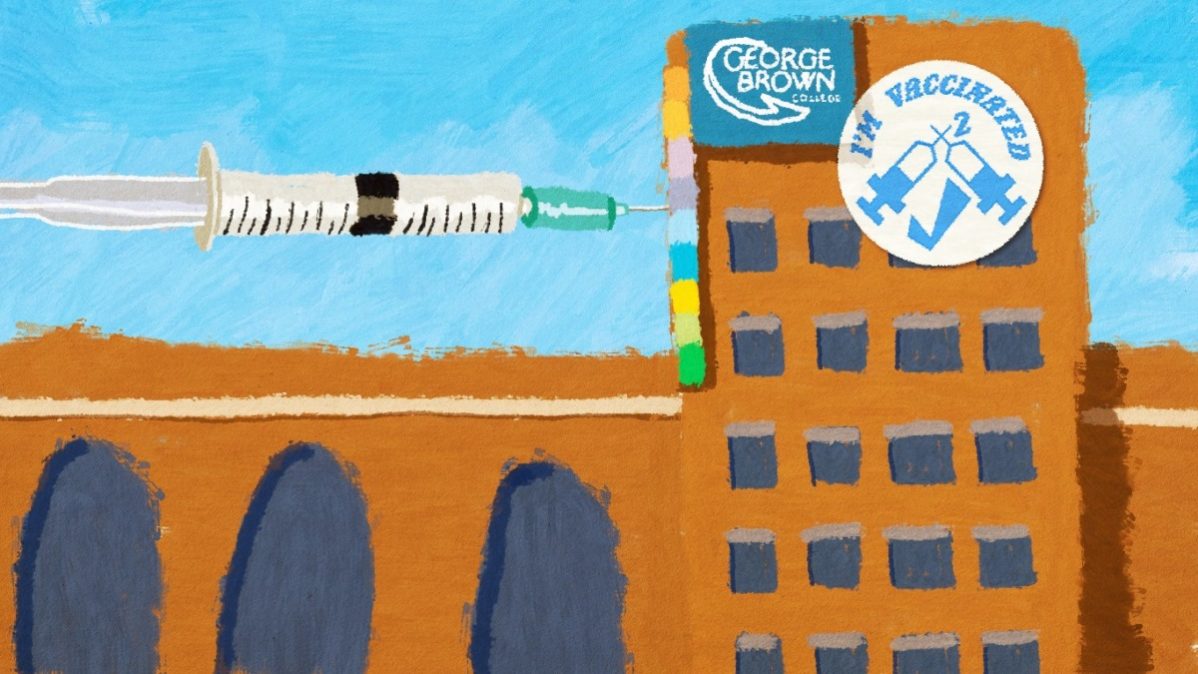Illustration by Katie Doyle
A sudden revision to George Brown College’s (GBC) policy on mandatory COVID-19 vaccinations, which removed the option for a negative rapid test, was announced this past Wednesday. The Dialog staff had the opportunity to discuss the amendment with Chris McGrath, vice president of student success, to expand on the reasoning behind the decision.
According to McGrath, various considerations went into the process. “One of those variables was the increasing case counts of the Delta variant, particularly among individuals who were unvaccinated,” he said. “We’re mindful of the fact that in our first week of classes between 20 and 25 per cent of the individuals coming onto the college campus were unvaccinated. That’s a really high number relative to the numbers of people who are coming in and out of the college.”
When asked why the Delta variant did not prompt as stringent an initial policy as it did for other institutions, including the University of Toronto and York University, McGrath explained that since each school is different and requires strategies that align with the “cultural readiness of the community.” The disparities in factors such as the physical campuses and plans for on-campus activity allowed for GBC to start with more relaxed measures.
McGrath also mentioned that at the beginning of September, the Ontario Chief Medical Officer of Health issued instructions about what COVID-19 protocol should look like for post-secondary schools. “We had to take a leadership role that aligned with the science that really does clearly show the best way to prevent the spread of COVID-19 is vaccination,” said McGrath.
In constructing and monitoring pandemic guidelines, both the perspectives of Toronto Public Health and the Ministry of Health were considered.
“I’ve sat in multiple meetings with those groups, as well as meetings with Dr. Kieran Moore, the Ontario Chief Medical Officer of health, and had the opportunity to listen to him and ask questions of him about what the reality of this looks like in the post-secondary space,” McGrath said.
GBC decision-makers also take direction from an internal expert, vice president of academic Dr. Corey Ross, a highly respected expert in the field of public health. McGrath said that Ross has been crucial in “guiding us through the process of reconciling the advice and the directions from public health authorities and putting that into the context of our community, which is really what public health is all about.”
While early surveying by the Student Association demonstrated a significantly positive reaction to vaccinations, the recent policy change has not been implemented without some hesitancy from certain groups. When vaccines were made mandatory for students living in residence or participating in athletics, the admin took note of how it could impact Black, Indigenous and LGBTQ+ folks.
The college had to consider “what the policy means for students and employees and community members who come from communities who have histories of either medical, experimentation, or being pathologized by the medical community,” said McGrath.
In response to these concerns, counselling was offered to those communities to help members reconcile their competing values.
“Not everybody’s going to be 100 per cent good with it, but at the end of the day, the decisions that we’ve made ultimately are in the best interest of the health and safety of our community.”
“I put into context, the fact that across Canada, COVID-19 has killed over 27,000 people. That’s roughly equivalent to the same number of students we have at George Brown. So if you look at the two, COVID has killed the equivalent population of our students. We have to take this seriously,” said McGrath. “There’s a very clear scientifically proven preventative method. There is a very short distance for me as a leader, as an educator to get from the problem to the potential solution.”
McGrath said the policy has made him more hopeful of a quicker return to campus. He claims the amendment will “more confidently allow students to come back into the college, to use the library, to access support services, and resources in ways that they have not been able to for the past 18 months.”
Discussions over plans for the Winter semester are already underway and McGrath says they are set to be announced within the next few weeks.


